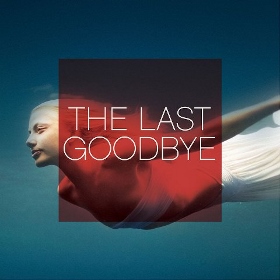NO HALLELUJAH FOR THE LAST GOODBYE
No one can deny why Jeff Buckley has achieved cult status. The coffeehouse-rock singer brought an aching, wrenching, ethereal and vulnerable quality to both his original songs and his covers of other composers’ work (his version of “Hallelujah” is widely regarded as the definitive interpretation of Leonard Cohen’s masterpiece). The soulful and multi-range tenor — who inherited the dark, waiflike good looks of his father Tim Buckley, the folk-rock singer who died of a drug overdose in 1975 — released his first complete studio album, Grace, in 1994. Almost three years later after extensive touring, Buckley was in Memphis recording a second album, Sketches for My Sweetheart the Drunk, when he died at 30 from an accidental drowning in a river that feeds the Mississippi.
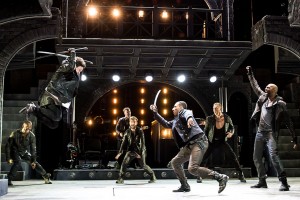 No one can deny why Romeo and Juliet has achieved cult status. Not only is Shakespeare’s comic tragedy one of the most enduring stories ever told, but it is a miracle of construction, containing highly relatable and seemingly countless universal themes and motifs that magically intertwine: War, bad timing, kinship, honor, love and destiny among them. Two teenagers from feuding families fall in love, but the ancient grudges and irrational combativeness of the Montague and Capulet clans force the adolescents to marry in secret. A series of misfortunes and hotheadedness lead to a heartbreaking conclusion, resulting in the possibility of reconciliation.
No one can deny why Romeo and Juliet has achieved cult status. Not only is Shakespeare’s comic tragedy one of the most enduring stories ever told, but it is a miracle of construction, containing highly relatable and seemingly countless universal themes and motifs that magically intertwine: War, bad timing, kinship, honor, love and destiny among them. Two teenagers from feuding families fall in love, but the ancient grudges and irrational combativeness of the Montague and Capulet clans force the adolescents to marry in secret. A series of misfortunes and hotheadedness lead to a heartbreaking conclusion, resulting in the possibility of reconciliation.
No one can deny why Michael Kimmel came up with the idea to fuse Buckley’s songs and Romeo and Juliet into a jukebox musical, The Last Goodbye, which opened this week at the Old Globe. The New York Times’ Chris Smith noted shortly after Buckley’s death that his Grace contained “rambling paeans to eternal love as well as gorgeous eruptions of wordless howls.” This would seem perfect for the reactions of hormone-fueled, first love teenagers in a world that doesn’t understand them.
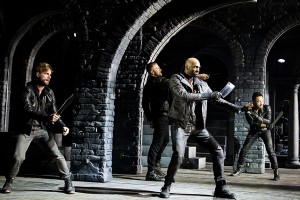 Unfortunately, the highly contemporized staging from Peter and the Starcatcher’s Alex Timbers proves that Kimmel’s idea seems as “death-mark’d” as the lovers therein. Romeo and Juliet are meant for each other; Shakespeare and Buckley are not. Shakespeare wrote his play in iambic pentameter, forms of sonnet, and blank verse (poetry written in unrhymed iambic pentameter). Buckley’s lyrics are elliptical and dense with mental imagery that is more about the author, not characters, which calls to mind the coffeehouse folk/rock of Joni Mitchell and Bob Dylan. And as with Dylan and Mitchell, Buckley didn’t sell out in an industry where doing so could be most profitable. But Buckley’s songs were meant for Buckley to sing, which explains why there have been few covers of his material; indeed, since his death artists have been more inspired to write songs about Buckley than to cover his songs.
Unfortunately, the highly contemporized staging from Peter and the Starcatcher’s Alex Timbers proves that Kimmel’s idea seems as “death-mark’d” as the lovers therein. Romeo and Juliet are meant for each other; Shakespeare and Buckley are not. Shakespeare wrote his play in iambic pentameter, forms of sonnet, and blank verse (poetry written in unrhymed iambic pentameter). Buckley’s lyrics are elliptical and dense with mental imagery that is more about the author, not characters, which calls to mind the coffeehouse folk/rock of Joni Mitchell and Bob Dylan. And as with Dylan and Mitchell, Buckley didn’t sell out in an industry where doing so could be most profitable. But Buckley’s songs were meant for Buckley to sing, which explains why there have been few covers of his material; indeed, since his death artists have been more inspired to write songs about Buckley than to cover his songs.
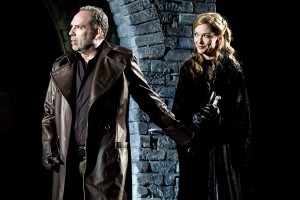 No one can deny why The Old Globe got behind this project. This regional theater usually seems to produce shows with its sights set on Broadway. For all of the musical’s indecipherability (lyrics are lost, scenes are edited), The Last Goodbye has all the elements and youthful virility that appeal to a new generation of ticket buyers — namely, Twilight-loving young women. Aside from the well-built, eye-candy swoon-inducing actors, the other elements on a producer’s checklist are Kris Kukul’s Glee-like high-decibel arrangements, Christopher Barreca’s medieval-like rock concert set, Sonya Tayeh’s robust So You Think You Can Dance movement, and Kate Waters’ amazingly well-staged fight scenes.
No one can deny why The Old Globe got behind this project. This regional theater usually seems to produce shows with its sights set on Broadway. For all of the musical’s indecipherability (lyrics are lost, scenes are edited), The Last Goodbye has all the elements and youthful virility that appeal to a new generation of ticket buyers — namely, Twilight-loving young women. Aside from the well-built, eye-candy swoon-inducing actors, the other elements on a producer’s checklist are Kris Kukul’s Glee-like high-decibel arrangements, Christopher Barreca’s medieval-like rock concert set, Sonya Tayeh’s robust So You Think You Can Dance movement, and Kate Waters’ amazingly well-staged fight scenes.
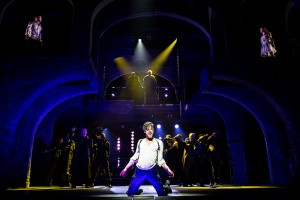 Yet right from the start, incongruity abounds. The fray of the clashing enemies occurs on the two-tiered set of grey-bricked monasterial arches when suddenly an upstage wall disappears to reveal the nine musicians, one of whom sings an innocuous tune into a microphone while rocking out on electric guitar. All this while macho boys in sexy black outfits (by Jennifer Moeller) grab their crotches and duel. Can you say, “Huh?” Later, the exact same musicians appear at the fête where R&J meet, except this time, it is Juliet who gets on the mike. It’s a great way for Romeo to espy his new love, but it’s just another moment where storytelling gets jumbled by the concept.
Yet right from the start, incongruity abounds. The fray of the clashing enemies occurs on the two-tiered set of grey-bricked monasterial arches when suddenly an upstage wall disappears to reveal the nine musicians, one of whom sings an innocuous tune into a microphone while rocking out on electric guitar. All this while macho boys in sexy black outfits (by Jennifer Moeller) grab their crotches and duel. Can you say, “Huh?” Later, the exact same musicians appear at the fête where R&J meet, except this time, it is Juliet who gets on the mike. It’s a great way for Romeo to espy his new love, but it’s just another moment where storytelling gets jumbled by the concept.
Speaking of jumbled, some of the group scenes include chorus members who upstage the main actors. If this is Mr. Timbers’ way of highlighting forbidden love, it 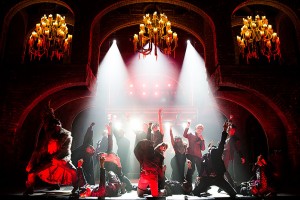 doesn’t matter because we are too busy craning our necks to figure out who’s speaking.
doesn’t matter because we are too busy craning our necks to figure out who’s speaking.
Some songs work nicely, such as “The Last Goodbye,” when the lovers separate after their night together, and “All Flowers in Time” during the balcony scene. But emotions are hardly heightened with lyrics the likes of “Aah, ooh / We could go / We can travel round / Fading farther from me / With your face in my window call / When will you weep for me / Sweet willow / It’s ok to be angry / But not to hurt me / Your happiness / Yes, yes, yes / Darling, darling/ Oooh.” This and Shakespeare’s prose are, to say the least, oil and water.
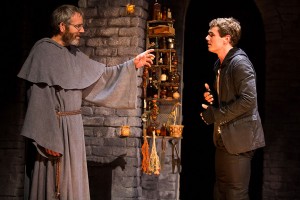 Plus, regardless of how eerily apropos some of the lyrics may be to the story, the songs utilized in the second act hardly heighten the stakes, and even serve to dissipate tension and interrupt the flow of the narrative, which has already been spliced within an inch of its Elizabethan life (16 songs plus the play only add up to a running time of 1:55). Plus, Kimmel adds some oddities to fit in another song: The lyrics are suitable for Romeo’s friend Mercutio when he sings “Eternal Life”: “While all these ugly gentlemen play out their foolish games / There’s a flaming red horizon that screams our names.” Unfortunately, he sings them after he’s been killed by Lady Capulet’s nephew, Tybalt. Even in this context, it’s strange that Mercutio (Hale Appleman, one of the few distinctive actors on stage) rises from the dead to deliver Greek Chorus-like summations.
Plus, regardless of how eerily apropos some of the lyrics may be to the story, the songs utilized in the second act hardly heighten the stakes, and even serve to dissipate tension and interrupt the flow of the narrative, which has already been spliced within an inch of its Elizabethan life (16 songs plus the play only add up to a running time of 1:55). Plus, Kimmel adds some oddities to fit in another song: The lyrics are suitable for Romeo’s friend Mercutio when he sings “Eternal Life”: “While all these ugly gentlemen play out their foolish games / There’s a flaming red horizon that screams our names.” Unfortunately, he sings them after he’s been killed by Lady Capulet’s nephew, Tybalt. Even in this context, it’s strange that Mercutio (Hale Appleman, one of the few distinctive actors on stage) rises from the dead to deliver Greek Chorus-like summations.
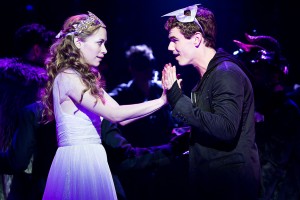 No one can deny that there is talent and money on stage or that clearly some moments work well in this star-crossed outing. Justin Townsend’s stupendous lighting includes dripping wax chandeliers, votive candles that appear out of nowhere, and tiny, twinkling bulbs. Next to some unsuitable line readings are some lovely interpretations of Shakespeare’s poetry. The death scene in the crypt has been creatively reimagined, but it’s distracting when blood spurts á la Sweeney Todd. And only you can decide if it’s appropriate that the Nurse (Tonye Patano) is now a stereotyped large sassy black woman who checks out Romeo’s ass with googly-eyed wonder and pursed lips (not that I blame her).
No one can deny that there is talent and money on stage or that clearly some moments work well in this star-crossed outing. Justin Townsend’s stupendous lighting includes dripping wax chandeliers, votive candles that appear out of nowhere, and tiny, twinkling bulbs. Next to some unsuitable line readings are some lovely interpretations of Shakespeare’s poetry. The death scene in the crypt has been creatively reimagined, but it’s distracting when blood spurts á la Sweeney Todd. And only you can decide if it’s appropriate that the Nurse (Tonye Patano) is now a stereotyped large sassy black woman who checks out Romeo’s ass with googly-eyed wonder and pursed lips (not that I blame her).
The big issue here is jukebox musicals. Based on the dreck in this category, a show’s popularity resides in the songs, not the libretto (Rock of Ages, Momma Mia!). While I applaud Kimmel’s attempt to add pre-existing tunes to a pre-existing play, I am praying the day will come when we spend millions of dollars training a new generation of songwriters so that we can give a last goodbye to this genre.
Video Of “The Last Goodbye” at the Old Globe.
photos by Matthew Murphy
The Last Goodbye
Donald and Darlene Shiley Stage
The Old Globe in Balboa Park
ends on November 3, 2013
for tickets, call 619.234.5623 or at Old Globe
